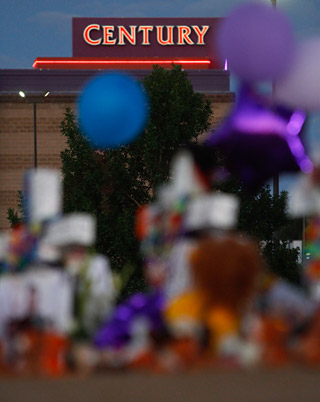 By Michael Muskal, Los Angeles Times –
By Michael Muskal, Los Angeles Times –
The case of Colorado shooting spree suspect James E. Holmes has moved into legal terrain familiar in many celebrated criminal cases: that between the media’s right to know and the legal system’s desire to investigate a crime while protecting the rights of the defendant.
Holmes was arrested after a gunman opened fire in an Aurora, Colo., movie theater showing the local premiere of the latest Batman movie, “The Dark Knight Rises.” Twelve people died and 58 were injured in the attack, some 25 minutes after the movie began after midnight last Friday.
(PHOTO: Lights of the Century 16 theater still burn in the background as dawn breaks with crosses, messages and flowers left at a roadside memorial in the foreground in Aurora, Colorado, Thursday, July 26, 2012. Funerals and memorials have begun for the 12 killed in the mass shooting and several of the 58 wounded still remain hospitalized. )
Throughout the weekend, police and political officials held frequent news conferences. Neighbors living near Holmes’ booby-trapped Paris Street apartment spoke freely and relatives of the victims and the accused shooter gave statements — if only to say in many cases that they had nothing to say and wished the media would respect their privacy and desire for silence.
All that changed however, once Holmes, 24, appeared Monday at his advisement — a pro forma proceeding designed to inform Holmes of his rights in the evolving criminal case. The defendant, sporting dyed reddish-orange hair, appeared dazed in the brief televised proceedings that provoked sharp anger from of the people who lost loved ones in the shooting. Wearing shackles, Holmes was returned to the Arapahoe County Jail, where he is segregated from the general population.
Since then, District Court Judge William Blair Sylvester, who is overseeing the case, has issued a series of rulings that have effectively cut back on the media exposure.
On Monday, the judge issued a gag order barring the defense team, the prosecution team and law-enforcement agencies involved in the case from speaking to the media.
On Wednesday, the judge reaffirmed his original order after several media outlets, lead by Fox News.com and the Denver Post, reported that Holmes had sent a notebook to a psychiatrist at the University of Colorado Denver, Anschutz campus. The notebook reportedly contained details of the planning for the shooting rampage, according to unnamed law enforcement sources quoted by the media. That could be important for the prosecution in showing that the suspect acted with deliberation and calculation.
Sylvester on Monday also signed an order barring the university, where Holmes was a former graduate student in the neuroscience program, from releasing any records about the defendant. Several news organizations, including the Los Angeles Times and The Associated Press, had filed requests for the records, which could give some insight into how Holmes, described by friends and teachers in Southern California as a brilliant science student, may have changed under the pressure of a new environment and scholastic program.
Further, when the next step in the legal process takes place, the reading of formal charges against Holmes on Monday, there will not be any repeat of the television coverage. That proceeding will be open to the media in the courtroom, but not to the millions of people who watched Holmes’ first appearance.
It is not unusual for the legal system to try to prevent a jury pool from being tainted by material that may not be allowed in evidence in what could be a death penalty case. Nor is it all that unusual for media outlets to sue to get more access or even for lawyers to be gagged for some of the same reasons that a judge might want to protect a jury pool.
For example, lawyers were gagged in the Jerry Sandusky trial on child sex-abuse charges involving some incidents that took place at Penn State University. Media outlets sued in Florida to get access to some material in the case against George Zimmerman, accused of second-degree murder in the shooting of Trayvon Martin.
What might be slightly unusual in this case is how soon the curtain has begun to be lowered, especially when it comes to the order on the school records.
Mark Caramanica, freedom of information director at the Reporters Committee for Freedom of the Press, told AP that the order was “highly unorthodox.” He said it was unusual that a public institution would consult with an outside entity instead of just following the law and answering the request.
“It seems very premature for a court to get involved and make such a sweeping order,” Caramanica said. “It seems like a very broad and overly aggressive approach.”








